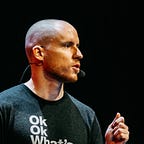WordCamp Europe is a WordCamp of WordCamps, one that aggregates the active community members of smaller or country-level communities. I saw it fitting that I proposed a talk dealing with not only understanding the kind of work we do, but further enhancing it.
This article summarises the main points of the talk, which I recommend you watch in full here on WordPress.tv (29:44 including Q&A).
Many of you have asked for some more detailed notes:
Situation
I mention a number of triggers and emotions that have lead to me proactively wanting to change the way I work. These are built around the following assumptions (again, the video does a better job):
- Executing tasks is our bread and butter. We take a task, deliver on it, feel a sense of accomplishment and repeat the process. Doing this all the time without ever coming up for air is poisonous towards the growth of ourselves as individuals. How can we continuously keep an eye on the bigger picture?
- The WordPress industry is doing well. So well, that people selling services within it are achieving financial success with relative ease. This success leads to a calendar full of client work, money in the bank yet no time for side projects or self development. Because WordPress is growing so fast, qualified workers can’t meet this increasing demand. This gap gives us the upperhand. What goes up must come down. How can we future-proof our success as opposed to building a house of cards?
- When I first started with side projects and shipping early ideas, I was able to move a lot faster. By turning my passion into my work, I’ve silently destroyed unstructured time. This leads to stagnation over time. I want to feel the same way I did when I first started. How can we execute on side projects and other ideas when our paid work is in the same industry?
Way forward
In efforts to align passion, interests and core drivers into work, I’ve iterated into some workflows that work for me.
Staying up-to-date (Instapaper + ReadKit)
Our industry moves at an incredible pace. It’s hard to keep track of every single development out there. It’s also not realistic, but something is (a lot) better than nothing.
I’ve combined Instapaper (Pocket is equally viable) and ReadKit to give me instant content whenever I have downtime (literally, when I’m offline on a plane or otherwise). It’s important to me that I have a tool that has good readability and is able to cache images in the background.
Task Management / Kanban (Trello)
Over the last 15 months I’ve started traveling more, usually not staying longer than a few weeks in any given place. When I used to work out of the same office, there was hardly an issue with managing my day to day with pen and paper. With the constant moving around and increasing work diversity, I had to seek out something more efficient. Trello was the only tool I found that met my requirements, but I had to tweak it in order to satisfy my largest requirement; knowing what is most important and urgent at any given time.
I use Trello in the traditional Kanban way of having lists that flow from idea to completion. The state of any given task (or Card in the case of Trello) is more important than an (unrealistic) due date.
I use the following lists from left to right: Shipped this Week ← Ship Today ← Ship this Week ← Accepted ← Future, Waiting on Someone.
Shipped this Week is used for our internal weekly update posts, hence I collect those items for that period of time (as opposed to having a daily collection or none at all). Easier then trying to remember everything.
Winning everyday (Trello Epics)
Something that is very important to me, is executing at least one Epic everyday. The concept is subjective, but whatever you deem an epic to be, it should probably be something rather unique and a way for either your company or yourself to up your game, move the machine forward a step further.
The challenge is then to chain as many epic days together as you can, get a winning streak going if you will. There’s plenty of work to be done on a daily basis, and keeping your eye on a few bigger wins helps keep it all together.
I designate epics with their own color label (Trello now allows unlimited labels which is great).
RescueTime & Accountability
Circling back to RescueTime. It’s not something I obsess over, but I do think it’s valuable when used correctly. Similar to Google Analytics, you can easily go in, see a lot of data and make no sense of it.
Seeing 1823 visits in analytics is the same as seeing 7.6 hours logged on RescueTime, means nothing without context.
Here’s how I created context:
- Find meaningful sub-categories (not main categories) and create reports based on that (i.e. Email or Meetings, not Communication).
- Devalue non-essential activities even if they would be considered productive to others. Doing front-end development is good use of my time, but not the best use of my time. Being in chat is communication, but it’s too passive/frictional to be considered productive. In both cases, I’ve devalued to Neutral.
Now I’ve edited the categories and you can see the results for the exact same week. I now know where I can improve, give it a try.
Feedback
If you have any comments or questions, feel free to comment here or to tweet me @noeltock
Credit
Thank you to the following people for providing feedback prior to presenting at # wceu: @tomwillmot, @azumbrunnen_, @karinchristen, @neverything & @sonjaleix
Images for slides (CC 3.0 or otherwise): Various images from Pexel, cover/forest, iphone, office, water, ocean, kindle/table, airport, laptop,
